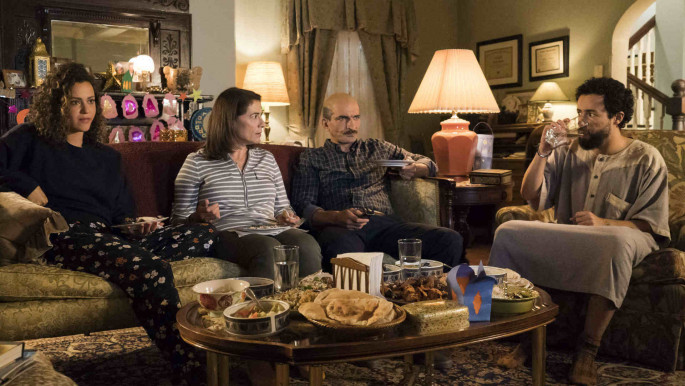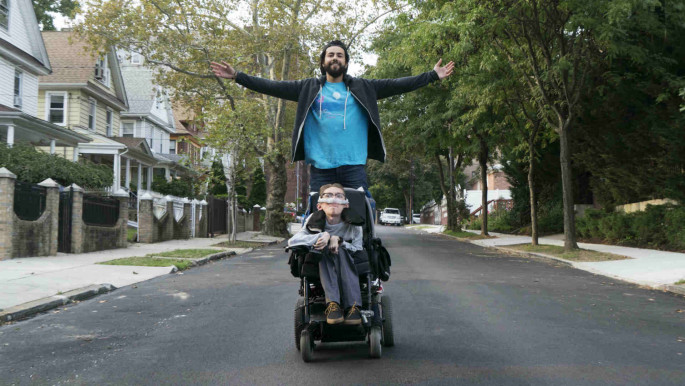Egyptian-American comedian Ramy Youssef's show is no 'How to be a Muslim' guide
Youssef's eponymous but only semi-autobiographical TV series Ramy managed to unleash discussion on Arab and Muslim Twitter, threatening to unseat perhaps the most controversial Arab debate online: is it ever acceptable to eat chocolate hummus or avocado knafeh (replace with other unorthodox flavours at your peril)?
"When you say those things I make a face like my father!" he laughs. "I respect everyone's beliefs and desires – but, for me, those things sound haram, to be honest. Sounds like a sin."
Ramy follows the title character, a millennial Egyptian-American guy struggling to understand and balance his career, sex life, faith and family.
In many ways, Ramy feels like a watershed moment for Arabs and Muslims on screen (and disabled people, with comedian Steve Way making his TV debut).
The show is nearly bilingual, with characters constantly code-switching between Arabic and English. Gone too is the Hollywood trope of hiring any old brown actor to play an Arab, with Egyptian actors Amr Waked, Al-Bernameg veteran Shadi Alfons, Palestinian actress Hiam Abbass, and Lebanese-Canadian comedian Dave Merheje joining Youssef in a rare showcase of Arab talent.
It's hard to think of a show or movie with nuanced depictions of Muslims – whether they're getting lectured on how to properly wash their feet before prayer, debating whether it's okay to drink as long as your tipple of choice isn't date or grape wine, navigating dating other Muslims or joking about moon-spotting and prayer times in the modern light-polluted, app-assisted age.
But it's also a show that categorically avoids discussing politics and especially terrorism, which for so long was the only way we would see Muslims and Arabs on screen.
When Ramy does deal with that dreaded topic, it is wildly different from any other piece of filmmaking. Youssef's genius episode tackling 9/11 looks at that fateful day through the eyes of a young boy trying to masturbate for the first time and faces up with the dangerous trope that all Muslims are constantly fighting the temptation to join ranks with the so-called Islamic State group.
"I think the era of 'just playing the terrorist' is over," Youssef tells The New Arab.
"Unfortunately," he says, "it can take stark realities" to get to the point where Hollywood executives are to produce something "humanising about this group that's been completely dehumanised."
When Youssef pitched Ramy, he tells The New Arab that he didn't have to fight too hard to bypass those stereotypes.
"I think the network was really excited to make this feel as grounded and real as possible," he explains. "It's not representative of anything more than just this type of Arab-Muslim family that might live in New Jersey. We really dug into it and it felt that the more specific we were, the more excited the network was."
Hulu, the US streaming service that released Ramy last month, was hungry to make something that hadn't been seen before, Youssef says.
So were viewers.
 |
| Egyptian-Jordanian actress May Calamawy, Palestinian actress Hiam Abbass and Egyptian actor Amr Waked star as Ramys' family [Hulu/Barbara Nitke] |
Youssef says he has received emails from fans who have told him that Ramy inspired them to fast during the Muslim holy month of Ramadan for the first time or to start praying again. Others told him they had "never felt so seen".
But he's also faced a lot of criticism from young Arab and Muslim viewers who see the show as a failed attempt to represent all Muslims and all Arabs.
 |
He's also faced a lot of criticism from young Arab and Muslim viewers who see the show as a failed attempt to represent all Muslims and all Arabs |  |
The weight of representation
The long-sought-after representation of any marginalised group can be a double-edged sword. With viewers so starved of seeing anyone like them on screen, it has become a near inevitability for shows like Ramy to be tasked with representing all Muslims.
Much of the criticism places Ramy in the same boat as fellow Muslim-American comedians Aziz Ansari's Master of None and Kumail Nanjiani's The Big Sick.
Many wonder if the only depiction of Muslims acceptable in Hollywood is that of "cultural Muslims" – those who have disavowed their "strict" parents and culture and can be seen drinking alcohol, eating pork and having sex outside of marriage.
More importantly, Muslim women say they have been sidelined on screen in favour of representations of Muslim men. Such efforts either fail to show Muslim women or look at them through cliches and offensive stereotypes, and instead prefer to show their male leads chasing after white women.
Ramy is guilty of all the above, according to critics. While the lead character doesn't drink, the overwhelming focus of the show is his sex life – or rather, his struggle to balance his desire to pray Friday prayers and fast during Ramadan but also party on a Friday night and go on dates.
Youssef says he was not trying to represent all Muslims or all Arabs but instead dive into the psyche of one character and one specific dysfunctional Arab-American family. These are intended as human stories, he says, not dictionary definitions.
"I've almost gone out of my way to ensure it doesn't feel like a 'how to be a Muslim' guide. I would prefer people to feel like this character is wrong, than to think that he may be right," the comedian explains.
The criticism, then, is welcomed by Youssef, who says Ramy's second season – which entered the writers' room this week – will try to satiate viewers who had hoped for more.
"I think that the danger of making a character that reads correctly [to Muslims], there then can be the disillusionment of this being somehow prescriptive and this somehow being something to follow," he explains.
"I'm really allergic to that. I'm allergic to putting out something that feels too idealistic because I don't think that's what comedy is meant to do."
Budding comedians, actors and writers from minority backgrounds with little representation in the media shouldn't fear similar criticism from their own communities, Youssef says.
 |
Budding comedians, actors and writers from minority backgrounds with little representation in the media shouldn't fear similar criticism from their own communities, Youssef says |  |
"I just want people to not feel the weight of needing to represent the whole community," he explains. "I would just urge those people... to just make the thing that speaks to their experience as fully and honestly as possible, and they will find the right audience and it will resonate with people."
 |
| Youssef's real-life best friend stars as Ramy's best friend Steve in the show [Hulu/Barbara Nitke] |
The dictatorship at home
There's a scene in the show when the title character travels to Egypt to reconnect with his family, some of whom more enamoured with the gifts Ramy has brought from New Jersey than with his presence.
Ramy and his extended family are sitting around the dinner table, when his uncles strike up a conversation about politics, more specifically about their admiration for US President Donald Trump and Egyptian President Abdel Fattah al-Sisi.
The scene is tongue-in-cheek; Ramy explicitly avoids diving into politics, and the moment is instead meant to draw attention to the "dictatorships in our homes", one of the central themes of a show that looks to interrogate a community from the inside. For example, the show examines sexism and bigotry in the community through the preferential treatment of Ramy over his sister Dena and the anti-Semitic, misogynistic and homophobic nature of the family's brash uncle Nasim.
"It kind of doesn't really matter to me if Trump is president, if Sisi is president… It becomes a non-factor if those mentalities exist on a local level," Youssef explains.
"Trump isn't really about Trump. It's more about uncle Nasim. It's more about looking at how we deal with those who have those kinds of ideas, while also wielding power and money – how do we check them, how do we understand them, how do we engage with them in our living rooms, and do we led that slide? And when we're letting that slide in our living room, it slides many ranks above when we start talking about the government and the state."
While Ramy steers clear of politics, Trump is only mentioned one other time – Youssef isn't afraid to wade into the controversy facing America's first Muslim-American congresswomen Rashida Tlaib and Ilhan Omar.
Both have faced extensive criticism for their pro-Palestine stances, much of which supporters say is clearly Islamophobic and racist in origin. Omar in particular has faced a smear campaign including attacks from President Trump.
"They're doing amazing work," Youssef says. "I think that their words are being distorted."
In the run-up to the 2020 elections, Omar and Tlaib have become useful targets for right-wing politicians, the comedian claims.
"I'm really just proud of them," he says. "I hope that the community continues to support them and step up for them, because I do think what they're doing and their work is urging the West to move in the right direction… on a lot of these social issues."
As Ramadan comes to a close, Youssef tells The New Arab that despite all the detrimental perceptions of Muslims Hollywood has reinforced over the years, Los Angeles actually isn't such a bad place to be a practicing Muslim.
"It's starting to align with Hollywood values," Youssef laughs. "The biggest health trend is intermittent fasting."
The city of stars is introspective and focused on self-care, he says, and people are open to hearing about fasting and the Muslim faith. While Muslims feel scarce on screen, he is also managed to find his own Muslim community in LA.
"It's not like the Middle East where the spirit of Ramadan is going to envelop you. Being a Muslim here, you have to seek it out," Youssef explains. "But if you do seek it out, you'll find it."
Ramy is available for streaming through Hulu, with international syndication pending.
Youssef's first stand-up special will be aired on HBO in June and his co-star Palestinian-American comedian Mo Amer's special is available to watch on Netflix.
Mel Plant is a journalist at The New Arab.
Follow her on Twitter: @meleppo


